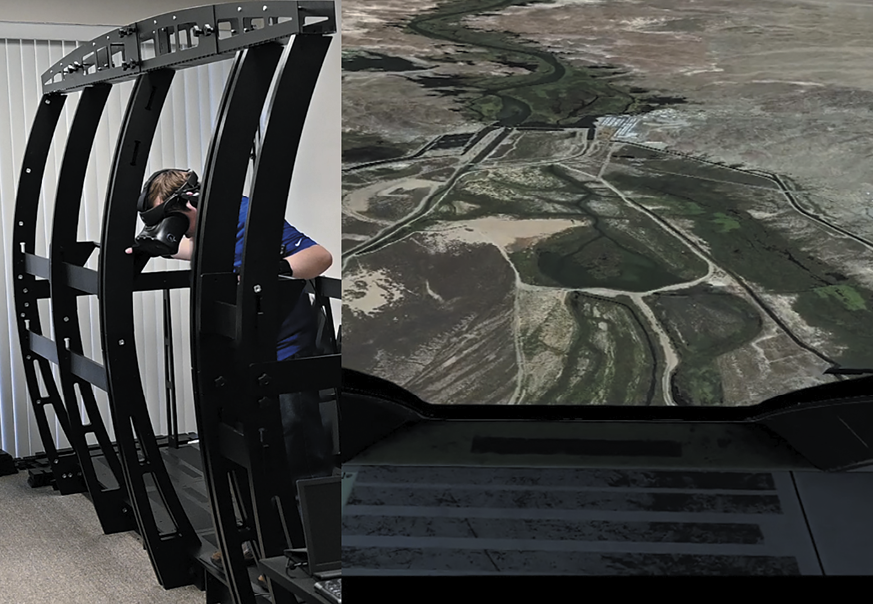- Home
- Media Kit
- MediaJet
- Current Issue
- Past Issues
- Ad Specs-Submission
- Reprints (PDF)
- Photo Specifications (PDF)
- Contact Us
- PRIVACY POLICY
- TERMS OF USE
![]()
ONLINE
![]()
ONLINE

Helping People
Learn Better,
To Live Better
Editors’ Note
Sandra Reiter brings more than two decades of operational and consulting expertise to the leadership of Vertex Solutions. She holds a master’s degree in business administration and a juris doctor degree from Columbia University and is a member of the New York and Massachusetts State Bars. She earned her BA cum laude from Middlebury College and graduated from Phillips Exeter Academy cum laude.
Company Brief
Vertex Solutions, LLC (vertexsolutions.com) is a high-technology learning enterprise company. Founded in 1997, Vertex specializes in progressing human performance by implementing emerging technology for better learning to promote and achieve customer confidence and success.

Multi-place Mixed Reality (MPMR) – Integration of
real-world avionics within a virtual environment
Will you highlight the history of Vertex Solutions and how the company has evolved?
Vertex Solutions – a women and minority-owned small business when I became CEO in 2020 – has been in the training and learning business for nearly 30 years. As the new CEO, and as we diversify into different categories and industries, I have never lost line of sight on our commitment to stay authentic in how and why we work. It is a mission to help people to learn better, to live better.
We have progressed from computer-based eLearnings to web-delivered and then mobile learning and gaming. While the foundation of our business is our expertise in every aspect of courseware development, from immersive Interactive Multimedia Instruction to precise 3D modeling and mobile learning, I came on positioned to develop Vertex into a technology company. Under my leadership, and with our exceptional team, we have become specialists in XR training, the term that encompasses any combination of virtual reality, mixed reality or augmented reality. We employ the mentor-protégé approach in our on-the-job training scenarios, which we have proven to be the gold standard for faster learning with longer memory retention and better job performance.
Our XR training, coupled with continuous courseware development, enables us to provide expert tutorial learning. This is followed by practice in an immersive 3D job-performance environment, complete with a data analytics “mentor” that delivers our users immediate feedback.
What are the results and benefits of this training method?
This XR approach to learning has been incredibly successful in addressing the pilot shortage we have been witnessing (and feeling) in both the Department of Defense and commercial aviation. We deliver lightweight, low-cost, multi-crew aircraft simulators, equipped with a comprehensive suite of avionics components. Every cockpit switch, knob, button and display is fully functional, including circuit breakers for emergency procedures and other specialized training tasks. Our three-seat, dual-control simulator is designed to fit into an ordinary 10-by-10-foot office space, and is powered by two 110-volt outlets, requiring no additional HVAC or building modifications. Simply put, we are training pilots and maintenance crews more effectively and at a lower cost, transforming the entire learning process, which in our business translates into protecting and saving lives.
One significant breakthrough is our achievement of military and commercial dual use, one of my initial goals, which means we now provide XR simulators to train commercial airline pilots. This dual-use technology allows for lower product cost, taking advantage of economies of scale and mass economies of scope.
We have already delivered more than 300 of our simulators to the Air Force, the Navy and commercial aviation customers. This spring, we will have employees providing pilot training with our XR simulators at nine military installations and one airline. We are also partnering with one of the leading eVTOL developers, producing a similar XR simulator for them with the expectation of receiving FAA certification for flight equivalency training.
As hundreds of pilots are actively using our XR flight simulators, we gain continuous and invaluable access to a rich source of user acceptance data. There are very few companies that deliver similar XR simulators at this scale that also undergo daily use by instructor and student pilots. We make high fidelity training accessible, responsive, current, and affordable, bringing the training to our users, addressing the costly (in terms of dollars and time) problems of where to train so we can focus on the how.

F-16 Mixed Reality Reconfigurable Fighter Trainer (MR-RFT) –
Vertex delivers numerous mixed reality aircraft configurations
(The appearance of U.S. Department of Defense (DoD) visual
information does not imply or constitute DoD endorsement)
How critical is innovation to Vertex’s future growth?
We are at a moment where our revolutionary pilot training technology coexists with a near-crisis-level pilot shortage for both the military and commercial sectors. As a leader within XR aviation training for the military, we are uniquely well positioned to take advantage of the natural synergies that exist between the military and commercial aviation markets. The military is willing to invest in new technology and willing to provide R&D funding to advance technology, while commercial aviation wants proven solutions.
On the flip side, adoption by commercial aviation builds credibility and enthusiasm in the military, resulting in new R&D for more complex scenarios and combat missions. This creates a symbiosis for improvements in aviation training, positioning Vertex in a sweet spot to address the pilot shortage in both commercial aviation and the military – this is what I refer to as a win-win. Currently, we are also progressing into new categories, such as Space Force, submarines, and electric boats, and have already won multiple Small Business Innovative Research awards to help make the transition to a number of Phase III commercialization contracts.
How important is it to build a diverse and inclusive workforce and do you feel that there are strong opportunities for women in the industry?
As mentioned, we are a women-owned and minority-owned business, with diversity a must, not a nice to have. Thinking alike can be dangerous, and the surest way to succeed in our mission is to create a workforce that encourages different perspectives to problem solve and avoid stagnation or complacency.
For example, we employ a healthy mix of military veterans who bring knowledge of the defense landscape, possess tested leadership qualities and excel at performing under extreme pressures. By integrating veterans into our workforce, Vertex not only honors their service, but also leverages their expertise to help us deliver on our customers’ complex needs and maintain a competitive edge.
While historically the defense industry has been male-dominated, we are seeing a shift to greater inclusivity at all levels. Women provide skills and perspectives that challenge what has been considered as norms and ignite innovation, critical in advancing any industry.

Military Freefall Jumpmaster Virtual Training System
(MFF JM-VTS) – Immersive training for any job
performance environment
What makes Vertex’s culture unique?
Having a strong company culture is equally as important as strong business fundamentals. As CEO, every single person in the company is important. I have to lead by example. At the same time, I have to empower everyone to be a leader and to appreciate when and how to be a follower. What we do is serious, and if, or really when, we encounter the unexpected, we rely on the strengths of each other to problem solve and course correct. There is no place for panic; instead, we pause, reset and move forward.
I ask myself, and our team, to make mini-miracles happen on a daily basis. I am especially proud of how involved we are in the communities where we work, live, and play, and since I have been CEO, many of our employees have taken positions at Chambers of Commerce, Economic Development Councils, and a variety of other professional organizations. We also support STEM education initiatives and military-advocacy organizations. We have an established history of providing robust internship opportunities, with several former interns currently serving on active duty.
In all of what we do, I am white knuckled over holding to my moral compass: surprise and delight your team, your family, your friends, even yourself and strangers, because the positivity you gain by helping someone learn and live better makes you better.
What do you feel are the keys to effective leadership?
As a minority – my heritage is Puerto Rican – and as a woman owner and CEO of a cutting-edge technology company, I believe in servant leadership. You have to be rigorous, become a subject-matter expert and earn the trust of those you are leading in order for them to want to be led. There is a significant difference between “needing” to be led and “wanting” to be led because you trust and believe in your leader.
I am not going to lie. I faced a steep learning curve in 2020 to become effective, including gaining my security clearance – now that was definitely outside of my wheelhouse. I had to listen and ask questions – a lot of questions. Once I got my tutorial in our landscape, learned our language and understood what excited the team and what kept them up at night, we could deliver together on a rational yet aggressive growth strategy. My team knows that I stand shoulder to shoulder with them, while also prepared to make the difficult decisions that come with being a CEO.
Initially my team only knew me by my professional background, so it was on me to prove how my years of legal and business experience would benefit them. I began my career as a corporate attorney and was comfortable in my practice, but I found myself drawn to being on the other side of the table. Immediately prior to Vertex, I was the Senior Vice President of Global Operations at a private equity-backed talent management firm. In my three years there, we were the fastest-growing firm in the industry, and I was responsible for all business operations and spearheading and integrating our mergers and acquisitions. I learned how to manage the delicate balance of business growth and stability, when to push hard and when not to push as hard – though in truth, I can’t say I really ever stop pushing.
I should add that I am the founder and former chairwoman of the Young Professionals Committee for the Susan G. Komen Greater New York City Breast Cancer Foundation. I started what became the first young professionals committee, which was rolled out across the nation and then internationally, raising millions and providing access to care to those who would otherwise be underserved. I also sit on the Board of Advisors for the Hospital of Special Surgery, which is #1 in the U.S. for orthopedics, #2 for rheumatology and top-ranked for pediatric orthopedics.
With every life move, I have challenged myself to get outside of my comfort zone by asking “why not” instead of “why.” People have described me as relentless, but I am okay with that. If I believe something will make someone or some situation better, “no” is not an answer. However, there is a fine and important line between relentless and reckless – move forward with awareness, grace and conviction – but conviction must be based on hard work and hard data. No deal has ever been made, and no one has ever been made better, on hope alone.
There’s no handbook for being a CEO. What made you ready to be one, and who did you turn to for guidance?
I would question anyone saying they are ready. You are never ready. But, you can be prepared. In addition to my educational and professional background, I was a competitive athlete and freestyle skier – the youngest member of the U.S. Junior Freestyle Ski Team in fact. The dedication, resilience, and grit this required helped give me the mentality and focus I need to be successful in business (and more). Being a CEO is hard work, which can mean a lot of “bruises” along the way, and I unapologetically show the sweat, sometimes literally.
As for people who have influenced me, the first, easy answer is my parents. My mom was born in Puerto Rico, never went to college and grew up in the Bronx, New York. She is a constant learner; she encouraged my ambition, but allowed me the space to make my own mistakes and accept that “good” is often better than perfect. I have learned that perfectly imperfect is my perfect.
I also grew up with a father who is well established within the business world, and benefit daily from his counsel. I am fortunate as well to work with my Vertex business partner, and stepmother, Kimberly Kozlowski, another female minority; while we are unafraid to disagree, we appreciate how to move forward in lock step once a decision is made. We are the definition of a modern blended family, which also translates into how we manage Vertex – family first. Another mentor would be Nancy Brinker, the founder of Susan G. Komen and former ambassador to Hungary. I credit her on teaching me to be unafraid to ask “why not?”
I would be crazy if I also did not spotlight the entire Vertex team, especially our President and COO, Dennis Wikoff. They have shown Herculean patience, educating me on the DoD, navigating government intricacies and translating the industry into terms that allow me to understand and consequently provide them with what they need in order to do what they do so exceptionally. The team is protective of me, as I am of them. They do make those mini-miracles happen on a daily basis, and they make my role not only easier, but fun.
What advice do you offer to young people beginning careers?
Be studied. Be passionate. Be courageous. Listen hard and learn, then choose your words carefully. I talk about the importance of actions. But, speaking up or staying (actively) silent has just as much place, power, and significance.
I would advise that adjusting to a business career can be an evolution. Initially, I missed the foundational rigor and security I experienced as an attorney. But, my legal training provided me with the platform and skillset to evolve with confidence. As any of us navigate careers, regardless of the years we have, difficult decisions will have to be made. You have to learn to be comfortable with being uncomfortable. Running a business won’t always make you popular, something my father cautioned me at a very young age. At the time, I found myself head scratching: How can that be possible if you’re the boss? Fast forward a few decades, I get it, and I live it.
A successful leader offers people – and themselves – the opportunity to learn better, to live better. Learn every day, I urge people, young and not so young alike, and with that, be better every day.![]()